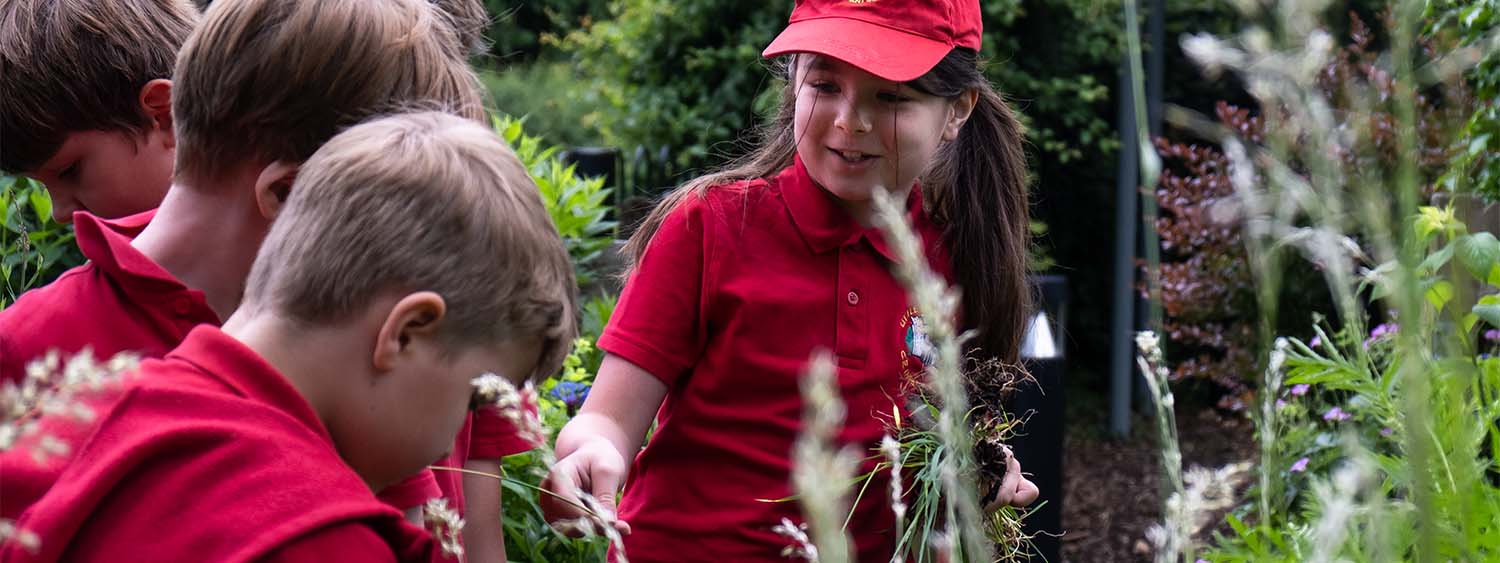
The climate and environmental emergency is the most important crisis our world is facing today. The good news is that we can all do something about it.
Resources
Eco Schools' Cut Your Carbon campaign has tons of inspiring ideas to get youth groups and schools involved in environmental issues.
Our Churchyard Nature Hunt can be used in churches and schools to help children connect with nature at a local level. Download the poster now.
Looking for more? Our EcoHub is a growing library of resources. Have a look through - type 'schools' or 'children' into the search box to help you whittle it down.
And don't forget we have a whole section on children, young people and families ministry - it's well worth a visit!
Be the Change
Be the Change is a diocesan campaign to help children and young people to be agents of change in responding to the climate and environmental emergency. We're encouraging schools, children’s and youth groups to hold four themed days using the resources below.
Be the Change days aim to raise awareness and help pupils consider the actions they can take to help the climate, including sharing messages with MPs. You'll find all the resources you need on this page for the four asks: Be Carbon Free, Be Vocal, Be Glitter Free and Be Plastic Free.
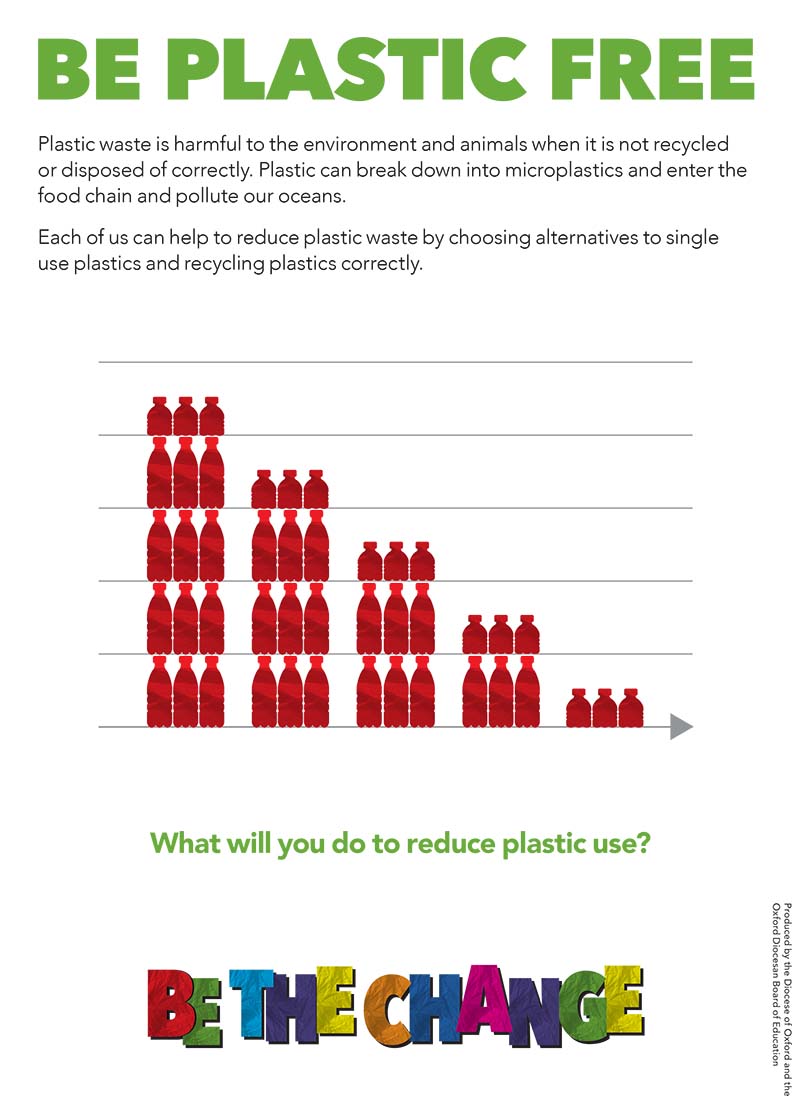 4. Be Plastic Free
4. Be Plastic Free
Be Plastic Free encourages children and families to consider how they might reduce their use of single use plastics, and learn how these can be a waste of the world’s limited resources and, if not recycled efficiently, cause pollution to our environment and harm wildlife.
There are simple and fun ways to reduce our use. The resources provided consist of a classroom poster, a teacher resource sheet with family newsletter item, and a pupil activity card.
Download everything you need:
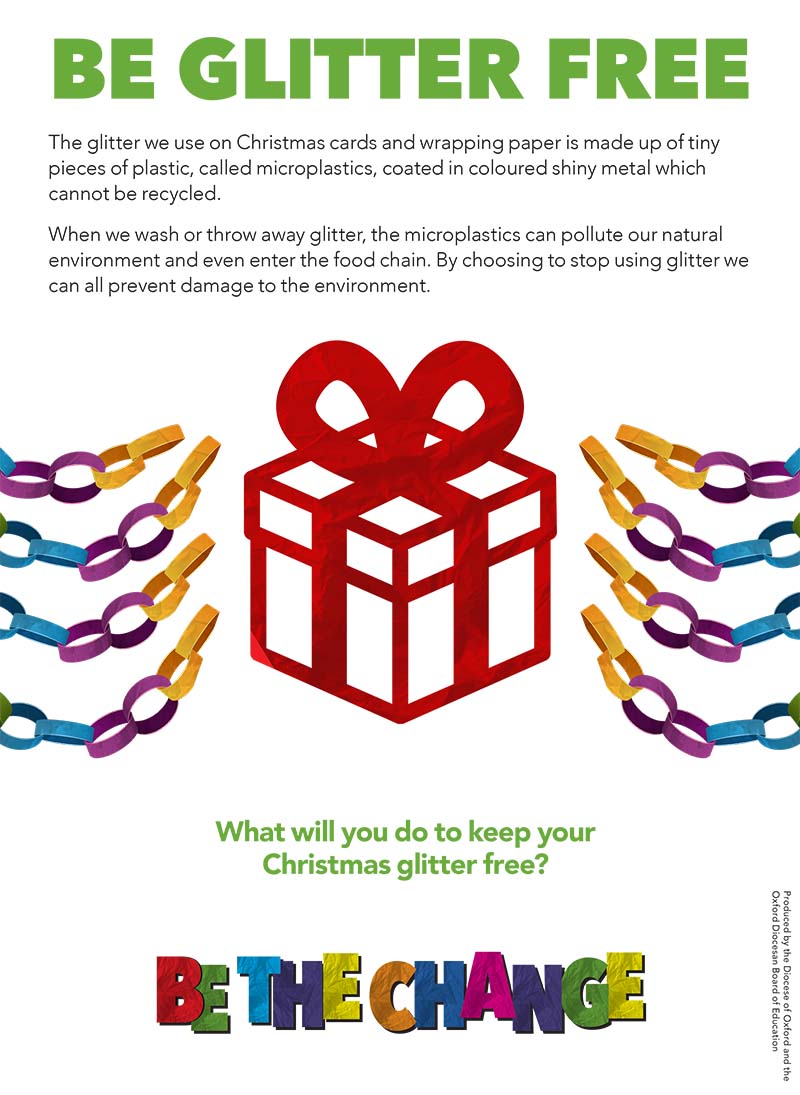 3. Be Glitter Free
3. Be Glitter Free
Be Glitter Free - learn about the impact of glitter microplastics on the environment and how children and young people can help reduce glitter pollution. The glitter we use on greetings cards, wrapping paper and sparkly makeup is made up of tiny pieces of plastic, called microplastics, coated in coloured shiny metal and cannot be recycled.
This theme, as with the other Be The Change resources, includes a classroom poster, a teacher resource sheet with family newsletter item and a pupil activity card.
Download everything you need:
2. Be Vocal
Action on climate change needs to come from each of us and from our government. That’s why we need to be vocal about change.
This Be The Change resource includes a classroom poster to download and print out, a teacher resource sheet, pupil activity cards together with classroom videos from the former Prime Minister, Theresa May and the Bishop of Oxford.
Download everything you need:
- Film: Theresa May MP
- Film: Bishop of Oxford
- Classroom poster
- Resource sheet and classroom activity
- Pupil card
Letters are starting to arrive!
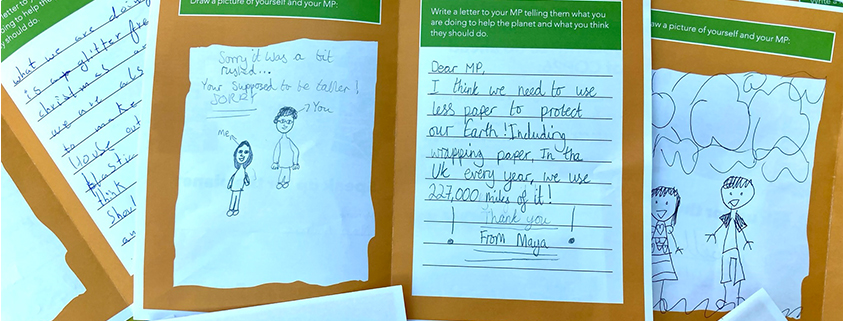
Schools from The Keys Academy Trust were among the first to use this month's Be The Change resources, writing *loads* of letters to their MPs!
1. 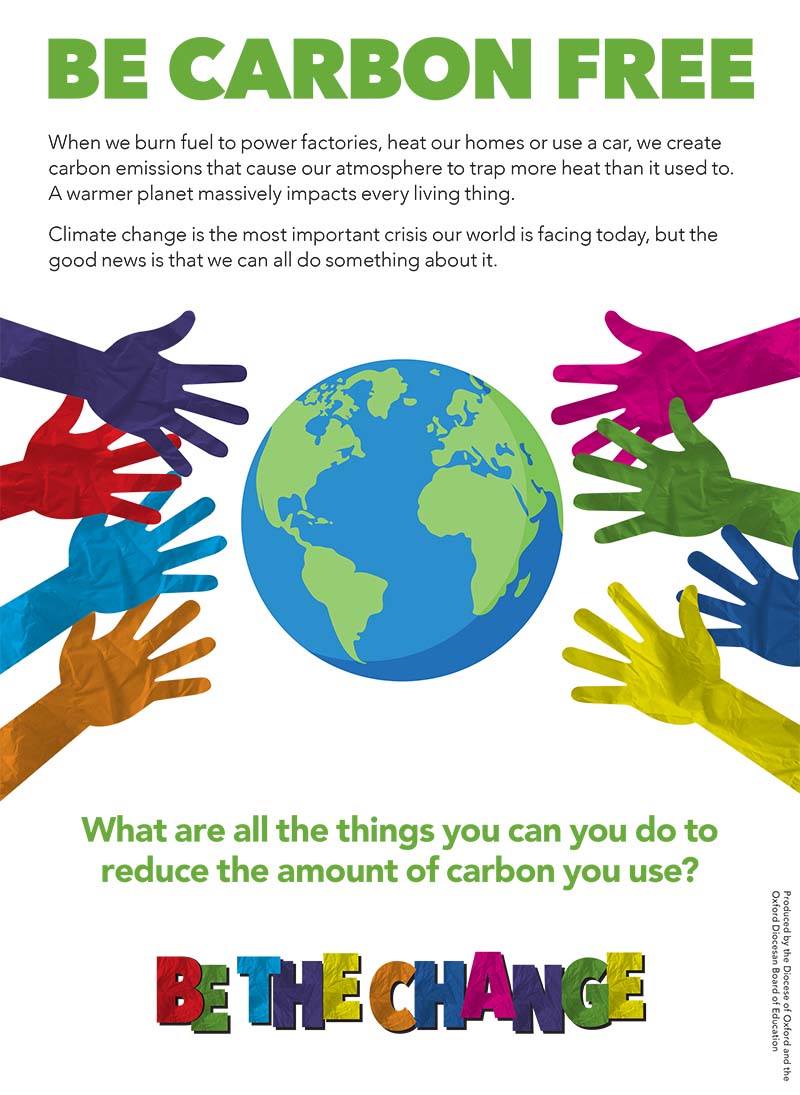 Be Carbon Free
Be Carbon Free
When we burn fuel to power factories, heat our homes or use a car, we create carbon emissions that cause our atmosphere to trap more heat than it used to.
A warmer planet massively impacts every living thing. Climate change is the most important crisis our world is facing today.
This Be The Change resource includes a classroom poster to download and print out, a teacher resource sheet and a pupil activity card.
Download everything you need:
Applying a faith lens
Be The Change resources are fully inclusive and useful to people of different faiths and world views. If you’re exploring the climate crisis in a Christian context, you may want to pick up on some of the following key themes relating to faith.
Click [+] below to find out more.
-
What does it mean to see creation as the gift of a loving God?
What do children see that is particularly beautiful? What does this beauty tell us about God? How do we take care of gifts that people give us? How do we say thank you?
-
How should we think about humanity’s calling “to tend and to keep” the earth?
In other words, what does it mean to care for the world around us?
-
Discuss the commandment to “love the Lord your God with all your heart and mind and soul, and to love your neighbour as yourself”
How is caring for creation a way of showing our love for God? How is it a way of showing our love for our neighbour?
-
Talk about the choices we make – and how we say sorry for the bad ones.
At this point, the failure to deal with the climate crisis is a result of human choices. We could choose to reduce our emissions more, as individuals and as societies, but often we don’t.
This is part of a wider pattern of turning away from the things God calls us to – which we see in many different parts of life. How do we say sorry to God for the times that we don’t show love of God and neighbour? How do we say sorry specifically for times when we don’t really take care of the earth? -
Thinking about the choices we make – and how we ask God to help us make good ones.
When we say sorry, it has to be more than words: it has to mean changing the way we do things. That can be hard. But the good news is that God not only offers us forgiveness for what we’ve done wrong in the past, God also is there to help us do better. How do we ask God for help?
What worked well?
What has worked well? Share your lesson plans and pictures of classroom activities to inspire others. We'll add them to our EcoHub for everyone to see.
- Upload your pictures / videos of classroom activities
Photography permissions should be in place for any children pictured - Upload lesson plans and other useful resources
Fit with SIAMS guidance
Be The Change raises awareness and promotes classroom activity around climate and our environment. It features four focus days each supported by teacher resources and materials. Each of the activities fits well with SIAMS guidance, particularly Strand 3 Character Development: Hope, Aspiration, and Courageous Advocacy.
Useful links
- Walk to school – tips and resources
- How to start a walking school bus
- Use traveline.info to map pupil journeys by public transport
- Use this data to prompt a classroom discussion about different modes of transport.
- Glitter is Litter
- Litter Free Coast and Sea
- Microplastics
- The Oceans and Plastics Pollution
- Marine Conservation Society
- An additional idea to combine a maths and shapes lesson with Christmas decorations.
- Plastic bottle greenhouse
- WWF Plastic is not fantastic
- National Geographic Kids vs Plastic
- Terracycle Crisp Packet Recycling Scheme
- Explore teacher-curated COP26 classroom resources on Twinkl
- Could you become a net zero school? Check out letsgozero.org and greenschoolsproject.org.uk